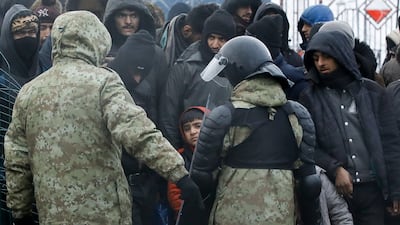If the aim of Belarusian leader Alexander Lukashenko is to sow discord within the EU by helping to create a migrant crisis on the Polish border, all the evidence suggests he is succeeding.
In recent weeks thousands of migrants, the majority of them fleeing conflicts in Syria, Iraq and Yemen, have congregated on Belarus’s border with Poland in the hope of entering the EU to make a better life for themselves.
The EU has accused Mr Lukashenko of being directly responsible for provoking the crisis by allowing migrants from Iraq and Syria to fly to Belarus and then dispatching them to the Polish and Lithuanian borders.
While the Belarusian leader continues to deny any involvement in causing the migrant problem, video footage has emerged which shows the Belarusian military using vehicles to try to take down Polish border posts and wire fencing. Lasers have been directed towards the Polish troops, making it impossible for them to see what is happening, and some migrants have been equipped with stun grenades to throw at the Polish security forces.
The possibility of such a crisis developing on the EU’s borders has been actively discussed in European defence circles. Last spring German intelligence officials produced a 19-page classified document detailing how an adversary might seek to promote border chaos to undermine the EU as part of a “hybrid war”.
And, to judge by the tensions that have arisen among EU states over how best to respond to the crisis, the tactic is having the desired effect.
A migrant crisis caused by people fleeing conflict in the Middle East is not a new phenomenon for European leaders. Tensions between EU member states flared in the summer of 2015 when German Chancellor Angela Merkel opened borders for Syrian refugees fleeing the brutal conflict in their home country to be granted sanctuary in EU states. The initiative met with stiff resistance from many European leaders, causing friction with east European countries such as Hungary, which continue to this day.
Consequently, the appearance of a fresh wave of migrants congregating on the Polish border has created a new crisis for Brussels, one that EU leaders believe has been deliberately instigated by Mr Lukashenko in retaliation for the EU imposing sanctions against his regime.
Relations between Belarus, a former Soviet state that still enjoys close relations with the Kremlin, and the EU hit a new low in the wake of the country’s controversial 2020 elections, which resulted in Mr Lukashenko launching a crackdown against anti-government protesters, with many prominent critics of his regime being forced to flee into exile while others were jailed.
The Belarusian government’s global standing plummeted further after a Ryanair passenger jet was intercepted and forced to land in Minsk, the Belarusian capital, in May to enable the country’s security forces to detain two opposition activists who were passengers on the aircraft.
Such conduct has led to the imposition of EU sanctions that directly target the Belarusian leader himself, as well as a number of his key acolytes.
Now the EU has accused Minsk of responding by deliberately creating the migrant crisis in an attempt to have the sanctions eased. There have even been suggestions that Russian officials encouraged their Belarusian allies into making this provocative move, although the Kremlin has strongly rejected the claim, with Russian Foreign Minister Sergei Lavrov accusing European leaders of creating the crisis through their involvement in the recent conflicts in Iraq, Syria and Libya.
To date, the EU has shown no sign of backing down over its sanctions policy. On Monday, EU foreign ministers held a meeting and agreed to move ahead with imposing more sanctions on Belarus – the fifth round of such restrictions. While the exact details are still to be confirmed, they are likely to include measures against the Belarusian airline Belavia, with the EU ending its leasing contract with the company. Travel agencies are also expected to be sanctioned if they help fly migrants from the Middle East and elsewhere to Minsk.
But while Brussels attempts to present a united front in the crisis, tensions between European leaders are increasing over how best to respond to Belarus’s acts, particularly after eastern countries on the front line accused Germany of side-lining them in the confrontation.
This follows a 50-minute call Mrs Merkel made to Mr Lukashenko earlier this week, the first conversation the Belarusian leader had held with a Western leader since last year’s election. During the call the pair reportedly discussed providing humanitarian aid to the migrants at the border, but the fact the call took place at all had drawn bitter criticism from a number of eastern European states, with Lithuania openly accusing Mrs Merkel of playing into Mr Lukashenko’s hands by giving him further recognition. Belarus media hailed the call as a success of Mr Lukashenko’s policy.
Poland, which is bearing the brunt of the crisis, was particularly aggrieved that it was given just an hour’s notice that Mr Merkel was contacting Mr Lukashenko. The call also succeeded in causing an upset in Latvia, which shares a militarised border with Belarus. “Are we happy with this phone call?,” asked Latvian Foreign Minister Edgars Rinkevics. “No. Are we hysterical about this phone call? Also no.”
And there have been accusations that major European powers such as Germany and France have been protecting their own interests at the expense of their allies in eastern Europe. This follows a phone conversation between French President Emmanuel Macron and Mr Putin during which the two leaders discussed the Polish border crisis in some detail. The call prompted complaints from Poland that the country was being left out of discussions regarding its own border.
Thus, while the EU attempts to maintain a united front as it seeks to tackle the latest migrant crisis to hit its borders, all indications suggest that attempts to sow discord among European leaders is starting to bear fruit.










